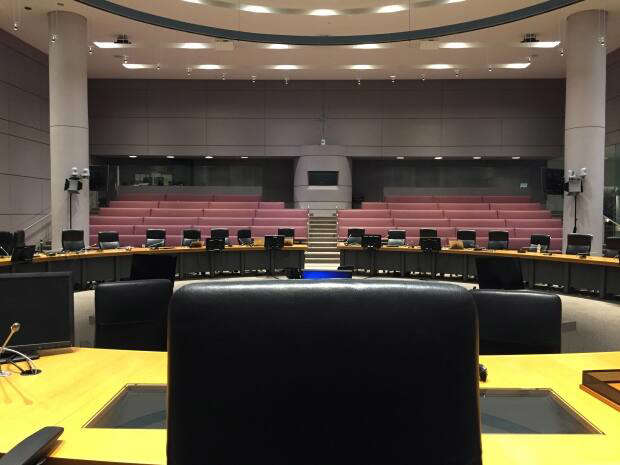‘Strong mayor’ system would silence elected representatives and community, councillor says

Premier Doug Ford has signalled he plans to set up a ‘strong mayor’ system for Toronto and Ottawa, but some local officials say the change would be undemocratic. | Kate Porter/CBC
From CBC News, July 20, 2022
By Dan Taekema
An Ottawa councillor says he was blindsided by news Premier Doug Ford is considering giving “strong mayor” powers to the city’s top elected official, a move one expert says would reduce the rest of council to a group of backup singers.
The premier suggested Wednesday that he plans to move ahead with introducing a strong mayor system in both Ottawa and Toronto before the municipal elections in October.
Exact details of what those powers would entail are still vague, but Ford told Global News outside Queen’s Park that they will include the option of vetoing council motions. It’s likely two-thirds of councillors would be able to then overrule the mayoral veto, he added.
“Frankly [I’m] blindsided,” said River ward representative Riley Brockington.
Extra mayoral powers aren’t something Ottawa or it’s councillors have ever asked for, he said.
“If you allow one member of council to have a veto or power to overrule that of council that means my voice is effectively eliminated and on behalf of my residents,” Brockington said.
The Toronto Star first reported Tuesday that Ford is considering legislation that would give stronger powers to the mayors of Toronto and Ottawa as part of a bid to get more new housing built in those cities.
Mayor Jim Watson is not seeking re-election. His office said he wasn’t available for comment Wednesday. The city said it would not be releasing a statement until the Municipal Act is amended.
Toronto Mayor John Tory has signalled he would support being handed expanded powers from the province.
It’s a “radical shift,” according to Stéphane Émard-Chabot, who teaches municipal law at the University of Ottawa and was once a councillor for the city.
“To me it impoverishes our democracy at the local level,” he said, adding it’s a very American way of doing things.
Role similar to a CEO
A “strong mayor” system is typically marked by the centralization of executive power with the mayor, who has control over department head appointments and oversees budgets.
It’s a system common in the United States, with the role of mayors akin to a CEO that operates in conjunction with but also independently from council.
Émard-Chabot said the switch to the system would be problematic in several ways, including the loss of a range of voices on council, and the risk that a mayor elected with a fraction of the vote could end up holding a lot of power.
“The more you concentrate power, the more you raise the risk of corruption,” he said.
He said it’s a shame the premier announced the change with an election around the corner, and said if the goal is to move files such as housing along more quickly the province could sit down with the cities and find ways to streamline the process.
“There are ways of … changing the role of mayor without turning councillors into a secondary, backup group of singers.”
Mayoral candidate calls system ‘anti-democratic’
Somerset councillor and mayoral candidate Catherine McKenney tweeted they believe the system is “anti-democratic.”
“If anything we need stronger cities rather than stronger mayors if we’re looking to build the types of communities people are looking for,” they said in an interview Wednesday.
Rather than a single, strong mayor, residents want thoughtful representatives that discuss issues and have an equal vote, McKenney said.
“I don’t believe that any one person knows what’s best for this entire city, myself included.”
Mark Sutcliffe, who’s also running for mayor, tweeted he would work collaboratively with council and that he’s prepared to “build consensus” using the current system.
“Nobody in Ottawa was asking for this,” he said in an interview on Wednesday.
“And my goal and running for mayor was to work within the current system with a democratically-elected council representing all of the city.”
When asked if would use the proposed powers, Sutcliffe said he would seek to form a consensus “regardless of what the rules are.”
Mike Maguire, another candidate, said the city would benefit from the change.
“Insofar as I understand it, the urgency the premier felt about this was to encourage housing and the development of housing,” he told CBC. “There is definitely an issue with city council and Ottawa generally with bylaw permitting and planning.”
Maguire said he thought the proposed powers could streamline the process.
Candidate Bob Chiarelli released a statement acknowledging many of the details around the powers aren’t known yet.
“[M]y first priority on major issues has always been to find or build consensus and facilitate important decisions,” the statement reads. “That’s my record. That’s my brand.”
Like Maguire, Chiarelli said in a statement he believes Ford’s plan “is intended to enable the mayor to initiate and complete important projects or files more quickly at their discretion.”
Brockington said his objection boils down to a single question — what problem is the premier trying to fix?
So far, the councillor said, he doesn’t have an answer.
“Yes, contentious matters sometimes are complicated and challenging and take a lot of time to get through, but at the end of the day, we collectively make decisions and that works.”
Read the article here









Leave a Reply